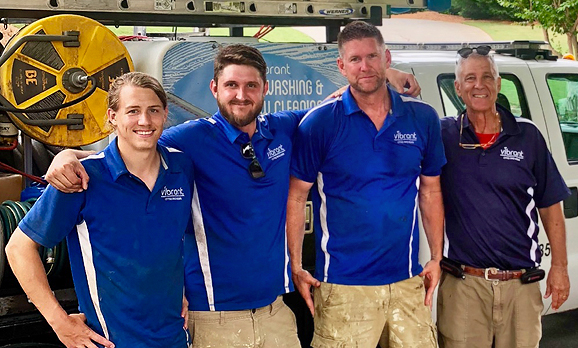
When your power washing business starts growing, one thing becomes clear fast: you can’t do it all alone. 💪
To handle high-volume jobs—like apartment complexes, shopping centers, or multiple residential bookings per day—you’ll need a skilled technician team that knows how to clean efficiently, represent your brand professionally, and operate equipment safely. But that kind of team doesn’t build itself. You have to train it—and train it right.
In this article, we’ll cover how to train a team that’s reliable, efficient, and ready to grow your business one surface at a time. 🚿📈
🤝 Why Training Matters More Than Hiring
Hiring someone with experience is great. But even seasoned pressure washers can develop bad habits, cut corners, or mishandle chemicals. Training ensures your crew:
✅ Performs every job to your standards
✅ Uses equipment safely and properly
✅ Understands the chemicals and when to use them
✅ Interacts respectfully with clients and the public
✅ Protects your reputation on every visit
Your business is only as strong as the people representing it in the field. 🛠️
🧰 Step 1: Start with the Right Tools and Systems
Before you train anyone, make sure you’re ready to train them. That means:
- 📋 Standard Operating Procedures (SOPs) for every service
- 🧼 Clear checklists for job setup and teardown
- 📸 Examples of correct vs. incorrect results (before/after photos)
- 🎓 A simple, consistent onboarding structure
- 📲 Digital tools (Jobber, Housecall Pro) for scheduling, notes, and reporting
Without structure, even the best employees will flounder. 🌀
🧑🏫 Step 2: Teach the Fundamentals
Every technician, regardless of experience, should learn the foundational skills:
🚿 Power Washer Operation
- Gas vs. electric unit usage
- Starting, stopping, and pressure adjustments
- Hose handling and reel usage
- Nozzle types and applications
💧 Chemical Handling
- Safe use of bleach, degreasers, and surfactants
- Proper mixing ratios
- Soft wash system handling
- Environmental safety (avoiding runoff)
🔐 Equipment Care
- Daily and weekly maintenance
- Recognizing wear-and-tear
- Safe transport and storage
🧼 Cleaning Techniques
- Surface-specific methods: concrete vs. vinyl vs. wood
- How to avoid etching, streaks, or overspray
- Surface cleaner usage vs. wand cleaning
This is hands-on training, not just a handbook. Let them shadow, then try it themselves under supervision.
Browse Amazon Here For Top Rated Power Washers And Accessories
🛠️ Step 3: Emphasize Efficiency Without Sacrificing Quality
Speed is important—but it comes after quality.
Teach your techs:
✅ How to lay out equipment before beginning
✅ Efficient hose management (no tangles!)
✅ Fast wand technique with even passes
✅ How to avoid rework by doing it right the first time
Use time tracking tools to monitor how long typical tasks take and create benchmarks for future jobs. 🕒
🗣️ Step 4: Train for Customer Interaction
Your techs are your brand ambassadors on site. That means teaching:
- 👋 Friendly greetings and clear communication
- 🏡 Respect for the property (don’t block driveways or damage landscaping)
- 📸 Taking before/after photos and noting anything unusual
- 📞 When to call the office instead of making promises
Make roleplaying part of your training. It’s not just about pressure—it’s about presence.
🔄 Step 5: Build a Shadowing and Mentoring System
Let new hires shadow your lead tech for the first few weeks. Give them smaller tasks like:
- Setting up hoses
- Pre-wetting surfaces
- Operating the surface cleaner under supervision
Gradually increase responsibility as they prove themselves. Assign mentors who can correct technique in the moment and model the behavior you expect.
🏅 Step 6: Certify Your Technicians Internally
Create a simple in-house certification process, such as:
- ✅ Written safety quiz
- ✅ Hands-on chemical mixing test
- ✅ Solo completion of a mock job
- ✅ Final walkthrough with team lead
Give them a certificate or even a branded hat or shirt once they’re cleared for solo or team operation. It builds pride and accountability. 🧢🎓
📈 Step 7: Create a Culture of Continuous Improvement
Don’t just train once and walk away. Encourage your crew to keep learning:
- Hold short weekly team huddles or toolbox talks
- Use group chats to share tips and success stories
- Reward improvements and exceptional work
- Send them to industry workshops or certifications
- Cross-train them on sales, quoting, and customer service
This keeps your team engaged, growing, and loyal.
⚠️ Mistakes to Avoid When Training Techs
🚫 Throwing new hires on the job with zero prep
🚫 Not checking for chemical knowledge or safety awareness
🚫 Ignoring soft skills like customer service
🚫 Skipping ongoing evaluation
🚫 Failing to correct poor habits early
Training is an investment—but not training is much more expensive. 💸
🔁 Bonus Tip: Create a Training Manual
Write a training guide that includes:
📘 Equipment checklist
📘 Service protocols
📘 Emergency procedures
📘 FAQ from past jobs
📘 Visuals and photos
This manual becomes a scalable system as you grow—no more reinventing the wheel every time you hire. 📚
💬 Final Thoughts
Building a technician team that can handle high-volume jobs isn’t just about hiring bodies—it’s about training minds and building trust.
With the right systems, structure, and support, your crew can confidently handle 5, 10, even 15 jobs a day—without sacrificing quality or burning out. And that’s how your business goes from small-time hustle to full-scale operation. 🚿🚀
Train well. Lead well. Grow fast. 💪🧼
Browse Amazon Here For Top Rated Power Washers And Accessories






